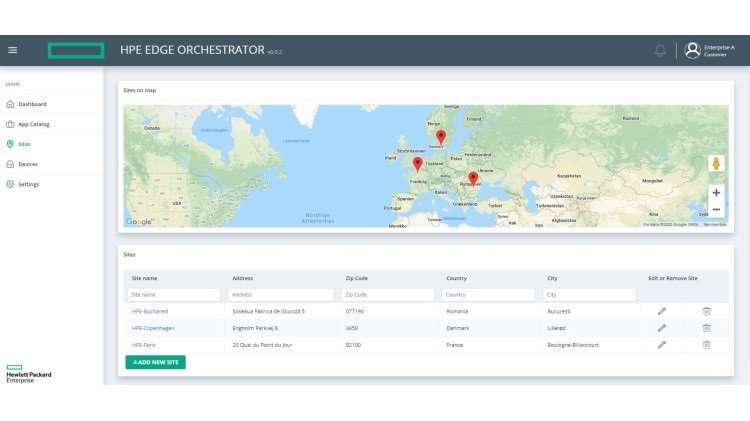Hewlett Packard Enterprise (HPE) today announced HPE Edge Orchestrator, a SaaS-based offering that enables telcos to deploy innovative new edge computing services to customers via IT infrastructure located at the edge of telco networks or on customer premises. With the HPE Edge Orchestrator solution, telcos can extend their offerings to include a catalog of edge computing applications which customers can deploy with a single click, across hundreds of locations. HPE Edge Orchestrator enables telcos to monetize the 5G network and telco cloud while bringing lower latency, increased security and enhanced end-user experiences to their customers.

With HPE Edge Orchestrator telcos can offer value-added edge services in their own right and can move from being primarily bandwidth providers to offering innovative edge computing applications, such as AI-powered video analytics, industrial automation and VR retail services. New revenue from these high-value enterprise services will also help to cover the significant cost of deploying new 5G infrastructure.
Following the launch of HPE’s open 5G portfolio and introduction of the cloud-native HPE 5G Core Stack, HPE Edge Orchestrator enables telcos to drive new revenue streams at the edge of telecom networks. HPE Edge Orchestrator unleashes the deployment and configuration of customer applications, provided as virtual machines or containers, at geographically-distributed edge locations owned by telcos, such as existing central offices or on customer premises. Customers can access edge applications via a self-service app catalog for simple management, monitoring and the deployment of an app to an edge device with one-click operation.
HPE Edge Orchestrator enables enterprises to easily combine their applications with network services offered by telcos, thus creating an end-to-end flow across the edge. Today, HPE Edge Orchestrator supports Multi-access Edge Computing (MEC) with other network-as-a-service (NaaS) functions being added to the catalog over time. The MEC platform enables applications to run at the edge, while delivering network services that ensure a dynamic routing of edge traffic in 4G, 5G and Wi-Fi environments.
With HPE Edge Orchestrator, along with HPE Edgeline and ProLiant servers, telcos can position application intelligence at the edge and unlock major business benefits for their customers:
• Lower latency: When applications can process requests locally instead of routing them to a data center, they can deliver much better performance. This translates to a better user experience for any business application. For the new generation of ultra-low-latency use cases like augmented reality and industrial automation, short round-trip times are absolutely essential.
• Bandwidth optimization: Positioning application intelligence out at the edge, such as doing number-crunching closer to where the numbers are generated, greatly reduces the wide-area network (WAN) bandwidth the application requires. This translates to lower WAN costs for businesses and less traffic congestion in telco core and metro networks. Applications like video analytics become much more efficient and, as a result, applicable to use cases that might not have been viable in the past.
• Improved security and privacy: Any time businesses transmit data over a network, they’re potentially exposing it to security threats. For the most sensitive information, some businesses want to keep everything onsite. In regions with strict privacy protections like the European Union, some applications may simply not be viable unless they can process all personally identifiable information (PII) locally.
With the recently announced Open Distributed Infrastructure Management initiative, HPE is simplifying the management of physical infrastructure deployments from core to edge. Now HPE Edge Orchestrator is enabling telcos to deliver new, targeted vertical solutions and enterprise applications —all centrally manageable across thousands of distributed locations through simple self-service tools.
HPE Edge Orchestrator provides a centralized, comprehensive, hardware-agnostic orchestration platform to provision, configure, and perform general management functions for all components of edge computing. HPE Edge Orchestrator is also multi-tenant by design. Telcos can give diverse enterprise customers their own “private” interfaces to manage their workloads, sites, edge devices, and services, while their own teams manage the entire CSP edge computing portfolio as a single system. HPE Edge Orchestrator can also work in conjunction with the recently announced Aruba Edge Services Platform (ESP), enabling enterprises to easily integrate both Wi-Fi-based and telco services.
HPE Edge Orchestrator will be available as a Service to telcos from July 31, 2020.












